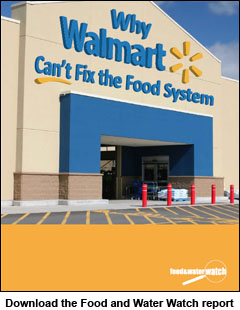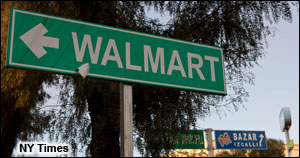NATIONAL
Walmart’s threat to our food, freedom, and democracy
By TOM GEIGER
Special to The Stand
You’ve probably heard how Walmart pays low wages and meager benefits and how they erode local businesses in small town America. But you might not be as familiar with their massive new plan to come into the urban markets of cities across the nation, how they’ve become the largest retailer of food in the country, or how their money is being used to influence laws that affect us all.

Part 1 of a 3-part Special Report
If not reined in, Walmart is on track to control our food supply, our freedom, and the very democracy upon which our nation is built.
As Walmart begins its serious attempt to expand into Puget Sound cities and other cities across the country, they face a growing tide of opposition to this urban expansion, and to their destructive business model and corporate secrecy. Walmart appears to be willing to say and pay just about anything to get what it wants. Walmart’s Public Relations machine puts it differently: the company’s senior community affairs director Steve Restivo was quoted in the The Seattle Times (6.24.12): “We didn’t do a very good job telling our story, and we let others manage it. That’s not undone overnight.”
Of course it would be easier for Mr. Restivo to “undo” Walmart’s image problem if that’s all it was. But their dilemma is far from superficial. Indeed it seems to be rooted at the very core of the corporation itself with a business model of “growth at any cost.” This drive toward relentless growth is increasingly a threat to the values held dear in local communities and around the globe. Whether Walmart can succeed in glossing over and covering up its dangers is yet to be known. What is sure is that those dangers are real and go far beyond just how they mistreat workers.
Who Controls Our Food?
 The fate of humanity in the 21st century will in part be about the security of our food system and who controls it. If you care about food security, you probably won’t be all that comforted by the fact that Walmart has become the largest food retailer in the U.S., which has given it strategic control of food production and distribution as well. The speed and size of their food grab is staggering. A Food and Water Watch report (“Why Walmart Can’t Fix the Food System,” 2011) found “now just over half of Walmart’s business comes from grocery sales. One out of three dollars spent on groceries in this country goes to Walmart.”
The fate of humanity in the 21st century will in part be about the security of our food system and who controls it. If you care about food security, you probably won’t be all that comforted by the fact that Walmart has become the largest food retailer in the U.S., which has given it strategic control of food production and distribution as well. The speed and size of their food grab is staggering. A Food and Water Watch report (“Why Walmart Can’t Fix the Food System,” 2011) found “now just over half of Walmart’s business comes from grocery sales. One out of three dollars spent on groceries in this country goes to Walmart.”
And while this connection between Walmart and our food supply is not commonly written or talked about, it is starting to get around. Food systems analyst Stacey Mitchell wrote an article in Grist.org (a site most commonly read by those supporting environmental protections): “In just a few short years, Walmart has become the most powerful force in our food system, more dominant than Monsanto, Kraft, or Tyson.”
The scale of Walmart’s food purchasing leads to a forced consolidation of food production and processing across the nation. Whether it is meat, dairy, produce or other more processed food products, it appears that Walmart has gained a stranglehold on production, and distribution.
As fewer and fewer companies are big enough to supply food on the scale and at a price point driven by Walmart, more and more of what we eat comes from fewer and fewer companies. As the story goes, you sign their deal at the price and specifications they demand or someone else will get the sale and access to their large and growing market share. This “deal with the devil” approach to our food system could have dire consequences for farmers, farm workers, local grocery stores, and others.
Mitchell adds that Walmart “has made food the centerpiece of its public relations strategy:”
In a series of announcements over the last year, Walmart has deftly commandeered high-profile food issues, presenting itself as a solution to food deserts, a force for healthier eating, and a supporter of local farming. It is a remarkably brazen tactic. On every one of these fronts, Walmart is very much part of the problem. Its expansion is making our food system more concentrated and industrialized than ever before. Its growth in cities will likely exacerbate poverty, the root cause of constrained choices and poor diet. And the more dominant Walmart becomes, the fewer opportunities there will be for farmers markets, food co-ops, neighborhood grocery stores, and a host of other enterprises that are beginning to fashion a better food system – one organized not to enrich corporate middlemen, but to the benefit of producers and eaters.
Threat to Local Communities
In Walmart’s world, growth begets growth. Their size, focus and obsession with growth — absent some outside force large enough, strong enough and willful enough to control it — allows Walmart to expand with few apparent limits.
Most of us think of Walmart in terms of its “Supercenters”: enormous boxes that sprawl across acres of real estate. While Walmart would prefer to have these huge stores everywhere that type of expansion in the U.S. was stifled over the last several years on a variety of fronts. Now they have modified their plans to expand into the “yet to be Walmarted” urban markets across the nation by using a smaller store that allows them to get around much of the local regulatory structures that have traditionally created hurdles to unbridled growth. The smaller store model allows them to move into stores the size of a small Safeway and in many cases focus on selling primarily groceries.
This US. urban expansion seems to be based in many ways on a successful model of expansion in Mexico less than a decade ago. In the mid 2000s, when Walmart decided to expand into Mexico, they had a relatively small market share, similar in some ways to what they now have in urban U.S. markets.
“Wal-Mart had bet big on Mexico, where it has demonstrated some of its most effective retail innovations. Of Wal-Mart’s 2,138 Mexican stores, 1,250 are relatively small Bodegas Aurrera stores…. Their success prompted Wal-Mart to use them as the inspiration for its new, small-format locations in the U.S. and Latin America.” (Businessweek.com, April 2012)
 However, it now has come to light that the Mexican expansion may have been based on something other than just hard work and business smarts. Allegations have arisen that Walmart’s Mexican expansion was greased by widespread bribery. The New York Times broke the scandal story in April 2012 and it has since been reported around the globe. If you have not seen this article, it is a must read.
However, it now has come to light that the Mexican expansion may have been based on something other than just hard work and business smarts. Allegations have arisen that Walmart’s Mexican expansion was greased by widespread bribery. The New York Times broke the scandal story in April 2012 and it has since been reported around the globe. If you have not seen this article, it is a must read.
The scandal allegations get worse if you are Walmart’s senior community affairs director Steve Restivo, who would like us to all think that their problem was just that they let others tell their story. Because the Times article not only documents the alleged bribery in detail, it goes on to discuss allegations that the scandal was known about and then hushed up back at corporate headquarters in Arkansas by some of the people at the very top. Investigations are now under way to look into these allegations.
The fundamental problems of transparency and accountability continue to raise reasonable concerns that Walmart’s word cannot be trusted. And this could create more problems for them as they attempt to break into U.S. cities and buy favor with substantial donations to local non-profits and politicians.
Behind the Smoke and Mirrors
As Walmart’s profits soar into the billions and billions, those at the very top of the corporate ladder have become some of the richest humans ever to live on the planet. Six Walton family members — who essentially control the company — have the combined wealth equivalent to the bottom 30% of the entire American population. The scale of that wealth poses a potential problem for corporate public relations. So the company is using indirect ways to buy a better image and position itself to make even more money.
The company’s PR machine is working to promote themselves as concerned with local communities — especially communities of color or those with lower incomes, even as it strong-arms suppliers and others into signing contracts that are so meager, or drag out paper-work and payments so long some go belly up.
A few years ago, as Walmart was working to get into to the Chicago urban market, they hired a minority woman owned company as the contractor to build a new store. Then Walmart used that cover in political and public outreach to stifle public criticism. Unfortunately, after the deal was struck to let Walmart in, the contractor and many other subcontractors either went belly up or spent years trying to get their bills paid after their work constructing the new Walmart was completed.
Walmart has even used its money to write new laws that help it make more money. The Stand Your Ground Law is an excellent case in point. PBS’s Bill Moyers show reported:
…Florida’s 2005 Stand Your Ground law, promoted across the country as ‘model legislation’ by the American Legislative Exchange Council, or ALEC — a corporate backed organization that has managed to keep a low profile even as it exerts vast influence.
 Who was in charge of ALEC’s Criminal Task Force when the National Rifle Association successfully lobbied the task force to support Stand Your Ground legislation? That’s right. A Walmart executive. And who is the largest seller of guns and ammunition in America? You guessed it again — Walmart.
Who was in charge of ALEC’s Criminal Task Force when the National Rifle Association successfully lobbied the task force to support Stand Your Ground legislation? That’s right. A Walmart executive. And who is the largest seller of guns and ammunition in America? You guessed it again — Walmart.
Back closer to home, Walmart is spreading a lot of money right here in the state of Washington. Not only has Walmart continued to contribute money to political candidates (like Rob McKenna who is running as the Republican candidate for governor), it has significantly increased its donations to charitable organizations in the state. Why?
The Seattle Times reports: “To improve its public profile, Walmart has endorsed such popular causes as hunger relief and environmental sustainability. It is also a charitable player, giving more than $15.1 million in cash and in-kind donations to local organizations in Washington state last year.”
Why Changing Walmart Matters
There is an emerging realization that by changing the way this giant corporation operates, we can not only improve the lives of the million-plus employees who work for Walmart, but wrestle back some control over our own lives. From food security issues to our rights as voters, from the sweatshops of Asia to our public education system, reining in the behavior of this corporate bully could help move us all away from the modern economic failures that seem to help only those at the top and toward an economy that is respectful of people, the planet and the democratic system itself.
To date, Walmart’s desired and massive expansion here and around the world has met with mixed results. As they have largely saturated the suburban/rural markets of the U.S. with thousands of Supercenters, they need to expand rapidly in other places. Their vulnerability is what could expose them to pressure for change. And by changing Walmart, we can strengthen the power of workers, communities and democracies both around the Puget Sound and around the globe.
Despite the Odds, Change Can Happen
When Walmart’s word cannot be trusted and yet they spend millions to buy either approval from supporters or at least silence from would-be opponents, it may seem hopeless to attempt to change their behavior. Fortunately, recent events show otherwise. Walmart will change if forced to with enough pressure. And the company’s relentless pursuit of profit and growth can create a chance for change.
Local opposition can and does have an impact. One example is in the northeastern U.S. where, for a variety of reasons, Walmart announced in June that it was scrapping plans to expand and open new stores in Boston. The same month, after a large-scale and nationwide public campaign to get them to pull out of ALEC (the corporate-backed think tank that pushed the “Stand Your Ground” law), they relented and pulled their support. Even the company’s move to smaller store formats is a reflection of the struggles of thousands of people against the devastating impact of Supercenters in their communities.
But we can’t underestimate the challenge before us. Changing this corporation’s behavior will take a concerted effort of millions across the nation: consumers, activists, workers, politicians, and leaders from faith, environmental groups, and communities of color. All these diverse interests will need to come together and understand the level of harm Walmart will cause to communities, our food, our democracy and our freedoms if not reined in and changed.
In coming weeks, this article will be followed by stories that tell the connecting fates of people and Walmart.
How does Walmart’s purchasing power impact those workers who are employed by companies in foreign countries who supply Walmart with its cheap products? How are workers throughout the supply chain, from truck drivers to warehouse workers impacted? How does Walmart’s concentrated wealth and political and charitable donations allow it to influence policies as seemingly unconnected to its mission as charter schools — which perhaps not so coincidentally will be on the November ballot in Washington state for the fourth time in two decades?
Stay tuned.
Tom Geiger is Communications Director for UFCW Local 21, Washington state’s largest private sector union more than 43,000 members working in grocery store, retail, health care, meat processing, and other industry jobs.





